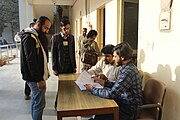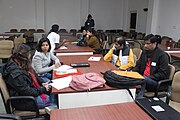Grants:Project/Rapid/Krishna Chaitanya Velaga/OpenCon 2018 New Delhi/Report
- Report accepted
- To read the approved grant submission describing the plan for this project, please visit Grants:Project/Rapid/Krishna Chaitanya Velaga/OpenCon 2018 New Delhi.
- You may still comment on this report on its discussion page, or visit the discussion page to read the discussion about this report.
- You are welcome to Email rapidgrants at wikimedia dot org at any time if you have questions or concerns about this report.
About
[edit]OpenCon 2018 New Delhi was an official satellite event of annual OpenCon. The primary objective behind this initiative was to make the participants knowledgeable about various open society initiatives. The conference was conducted on 3 February 2018 at Acharya Narendra Dev College. It included two parallel tracks; track 1 had talks by various open society advocates, discussions on ways to promote Open Access culture in India, whereas track 2 participants were trained on Wikidata. Including organizers and speakers, the event witnessed 54 participants. It was hosted by Krishna Chaitanya Velaga, and was organized with the help of Abhinav Srivastava, Satdeep Gill, Suyash Dwivedi, Tanveer Hasan, Tito Dutta, and Yohann Thomas. Talks presented by various Open Society advocates are as follows:
S.No Name Position Organization Title of the presentation 1 Dr. Savithri Singh Principal Acharya Narendra Dev College Introduction to Creative Commons 2 Sridhar Gutam Convenor Open Access India Opening Up of Access to Publicly Funded Research in India: Status and Way Forward 3 Dr. Harinder Pal Singh Kalra Professor Punjabi University Open Access Resources from India and in Indian languages &
Open Access Journals and Predatory Journals: Global and Indian context4 Tanveer Hasan Programme Manager CIS-A2K Wikipedia Education Program 5 Dr. Arul George Scaria Assistant Professor National Law University Promoting Open Science in India: Insights from an Empirical Study 6 Prof. Jitendra Shah Research Scientist IIT Bombay Community Geographic Information Systems
Goals
[edit]Did you meet your goals? Are you happy with how the project went?
- Yes, we did meet our goals. Though there is less participation in the Wikidata workshop i.e. track 2, the event as whole went well. Further details are explained in the following sections.
Outcome
[edit]Please report on your original project targets.
| Target outcome | Achieved outcome | Explanation |
| 50 participants | 54 participants | 41 general participants + 6 speakers + 7 organizers (including one host) |
| 20 Wikidata workshop attendees | 17 Wikidata workshop attendees | Wikidata workshop was conducted as the track 2 of the conference. The activity of the session can be seen at: https://outreachdashboard.wmflabs.org/courses/WikiProject_India/OpenCon_2018_New_Delhi_Track_2/home. Etherpad: https://etherpad.wikimedia.org/p/openconindia |
| 5 organizers | 7 organizers | Organizers include
|
Learning
[edit]Projects do not always go according to plan. Sharing what you learned can help you and others plan similar projects in the future. Help the movement learn from your experience by answering the following questions:
- What worked well?
- The overall target of the conference i.e. to make the participants knowledgeable about various open society initiatives, has been achieved.
- We had good representation from various institutions—Delhi University, International Centre For Genetic Engineering and Biotechnology, Wikimedia Foundation, Jawaharlal Nehru University, DataMeet, IIM Lucknow, IIT Delhi, IGNOU, Government of Delhi, Aricent Technologies etc.
- Addressing the gender gap, sixteen participants i.e. ~30% of the participants were women.
- Track 1 of the conference included a discussion round on "Future of Open Access in India" to collect ideas to increase awareness about Open Access in India, and the potential role of Wikimedia projects in promoting Open Access. This discussion went very well, and the inputs from the participants are explained in detail in a separate sub-section of this section.
- Though initially it was planned for a paid venue, we were able to get a free venue. So with the budget allocated for the venue, we're able to fly in some speakers from other cities, and include more organizers as well.
- The conference gave form to the "Delhi Declaration on Open Access". It was drafted during pre-event proceedings, discussed and reviewed on the day of the conference. Eventually, it was adopted on 14 February 2018, and has been signed by more than fifty open access advocates from India. The complete text can be seen at: http://openaccessindia.org/delhi-declaration-on-open-access/.
- What did not work so well?
- Of 78 registrations, only 41 of them turned up on the day of the event. Due to this, some of resources that were purchased on prior hand were put to no use.
- As the participants arrived late, the program was delayed by one hour, so we had to delete some sessions, such as video content from OpenCon, to get back on track.
- As there was only one trainer for Wikidata, some inconvenience in handling the entire workshop had been reported.
- What would you do differently next time?
- For events, where registration is free, the participants turn up would be 60% of the registration. So it better to plan resources accordingly, than for the all the registrations. The participation can also be increased by charging a nominal participation fee. This'll make them more committed towards the event they have registered for.
- In cities, it is better to start the schedule after 9:30 am.
- In such conferences, to reduce the expenditure, some speakers may be allowed for remote presentation through Skype, Hangouts etc. Also set-up a YouTube/Facebook live, and share the link to public for remote attendance.
- At least, two trainers are to be assigned for workshops.
Inputs from group discussion on "Future of Open Access in India"
[edit]
- For track 1 participants, a group discussion has been conducted to collect ideas to increase awareness about Open Access in India, and the potential role of Wikimedia projects in promoting Open Access. Inputs from the discussions are as follows:
Problems identified: "Problems obstacles for Open Access movement in India"
[edit]- Government policies don't mandate Open Access.
- Lack of awareness among the people about available knowledge resources that are already open (NCERT, Wikipedia etc.)
- Technical complexity of aggregating or retrieving knowledge. For example, map of a city as PDFs in fragmented pieces.
- Lack of actionable information: Information is being dispensed in pieces.
For example, water resources as minor sources, medium sources, large sources, are not available as on a map. - Knowledge is being used a money making tool: A king of rat race, that leads to confiding of your creations.
- Lack of education on Intellectual Property Rights at graduate level.
- No proper channel or platform exists for collaboration on Open Access.
- Misconception among the general public that contributing to Open Access strips off all their rights on the material or content.
- Lack of institutional promoters of Open Access policies.
- Due to high competition & limited resources, people keep their knowledge/information to themselves to monetize it later.
- Most of the discussions on Open Access are driven English language only. Emphasis is not being laid on translation of content that is already open, thereby hindering the participation from non-English communities.
- Information repositories/website that claim to be open, don't enforce them with proper licenses, thereby ultimately putting them to no use.
- Predatory journals are further scaring researchers from Open Access.
- Lack of coordination among the nations of 'Global South'.
- Primary role player of Open Access in India—Open Access India, is playing a passive role in promotion of Open Access.
Solutions proposed
[edit]- Emphasis must be laid on peer to peer encouragement of pre-print sharing of an article.
- Provide incentives for researchers to publish in Open Access.
- Bring pressure on the government adopt Open Access policies, or at least, support the open society advocates & organizations. Potential organizations to take this ahead include Centre of Internet & Society, Wikimedia India, Open Access India, Acharya Narendra Dev College, IITs/NITs.
- Educational institutions must include courses on Intellectual Property Rights, and sessions about Open Access at graduate, and post-graduate level.
- More OpenCon satellite events should to be organized, especially at educational institutions.
- Provide a certification sort of thing on Open Access.
- Open Access India must become active, and establish identity as a non-government non-profit organization with full-time activities, and must be have members for participation. OA India must take the lead in organizing sessions on Open Access, and promoting it through various channels.
- Students must be motivated to promote Open Access, by making understand the need and importance of Open Access. Student ambassadors may be appointed at regional levels to promote Open Access.
- Magazine (at least an e-Magazine) has be to established to make the public aware of latest updates related to Open Access in India, and call for articles to be published in that magazine.
- Forums/Wikis are to be established to discuss Open Access issues.
Finances
[edit]Grant funds spent
[edit]Please describe how much grant money you spent for approved expenses, and tell us what you spent it on.
| S.No | Type | Details | Amount (INR) |
|---|---|---|---|
| 1 | Promotions | Event promotion through social media channels, post cards etc. | ₹5,702.00 |
| 2 | Logistics | Conference kits, stationery etc. | ₹23,648.00 |
| 3 | Travel | Travel expenses of organizers | ₹43,062.00 |
| Travel expenses of speakers | ₹11,975.00 | ||
| Local travel through cab/metro | ₹6,990.01 | ||
| 4 | Accommodation | Accommodation for organizers | ₹11,900.00 |
| Accommodation for speakers | ₹3,622.00 | ||
| 5 | Food | Refreshments and lunch for participants on the day of the event Food for organizers and speakers on pre/post-event days |
₹21,330.30 |
| 6 | Miscellaneous | Undocumented expenses | ₹800 |
| Total expenditure | ₹129,029.31 | ||
Remaining funds
[edit]Do you have any remaining grant funds?
| Description | Amount (INR) |
|---|---|
| Total budget allocated | ₹129,500 |
| Total reallocation from previous grants | ₹96,148.80 |
| Total received from WMF | ₹32,940.20 |
| Total funds received | ₹129,089.00 |
| Total expenditure | ₹129,029.31 |
| Under spent funds | ₹59.69 |
Anything else
[edit]Anything else you want to share about your project?
Images
[edit]-
Banner at the entrance of venue
-
Participants reporting at registration desk
-
Host delivering the welcome address
-
Participants during Session 1 by Dr. Savithri Singh
-
Prof. Jitendra Shah interacting with a participant during tea break
-
Tito Dutta handling the Wikidata workshop
-
Satdeep Gill presenting about the Wikimedia awareness in India
-
Tanveer Hasan presenting about Wikipedia Education Program
-
Hindi Wikipedians Ashish Bhatnagar and Jayprakash
-
Participants during discussion round









